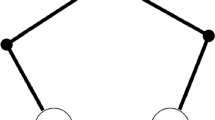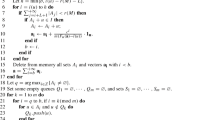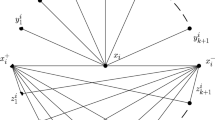Abstract
In bilevel programming there are two decision makers, the leader and the follower, who act in a hierarchy. In this paper we deal with a weighted matroid problem where each of the decision makers has a different set of weights. The independent set of the matroid that is chosen by the follower determines the payoff to both the leader and the follower according to their different weights. The leader can increase his payoff by changing the weights of the follower, thus influencing the follower’s decision, but he has to pay a penalty for this. We want to find an optimum strategy for the leader. This is a bilevel programming problem with continuous variables in the upper level and a parametric weighted matroid problem in the lower level. We analyze the structure of the lower level problem. We use this structure to develop local optimality criteria for the bilevel problem that can be verified in polynomial time.
Similar content being viewed by others
References
Bard JF (1998) Practical bilevel optimization—algorithms and applications. Kluwer Academic, Dordrecht
Cook W, Cunningham W, Pulleyblank W, Schrijver A (1998) Combinatorial optimization. Wiley, New York
Dempe S (2002) Foundations of bilevel programming. Kluwer Academic, Dordrecht
Dempe S (2003) Annotated bibliography on bilevel programming and mathematical programs with equilibrium constraints. Optimization 52:333–359
Dempe S, Kalashnikov V, Ríos-Mercado RZ (2005) Discrete bilevel programming: application to a natural gas cash-out problem. Eur J Oper Res 166(2):469–488
Fanghänel D (2006a) Optimality criteria for bilevel programming problems using the radial subdifferential. In: Dempe S, Kalashnikov V (eds) Optimization with multivalued mappings: theory, application and algorithms. Springer, Berlin, pp 73–95
Fanghänel D (2006b) Zwei Ebenen Optimierung mit diskreter unterer Ebene. Dissertation, TU Bergakademie Freiberg. Available via http://fridolin.tu-freiberg.de/dissliste.html
Fanghänel D, Dempe S (2009) Bilevel programming with discrete lower level. Optimization 58(8):1029–1047
Fujishige S (2005) Submodular functions and optimization, 2nd edn. Annals of Discrete Mathematics, vol 58. Elsevier, Amsterdam
Heuberger C (2004) Inverse combinatorial optimization: a survey on problems, methods, and constraints. J Comb Optim 8:329–361
Kalashnikov V, Ríos-Mercado RZ (2001) A penalty-function approach to a mixed integer bilevel programming problem. In: Zozaya C et al (eds) Proceedings of the 3rd international meeting on computer science, Aquascalientes, Mexico, vol 2, pp 1045–1054
Schrijver A (2003) Combinatorial optimization: polyhedra and efficiency. Springer, Berlin
Vicente LN, Savard G, Judice JJ (1994) Descent approaches for quadratic bilevel programming. J Optim Theory Appl 81:379–399
Vicente LN, Savard G, Judice JJ (1996) The discrete linear bilevel programming problem. J Optim Theory Appl 89:597–614
Author information
Authors and Affiliations
Corresponding author
Rights and permissions
About this article
Cite this article
Fanghänel, D. Optimality conditions for a bilevel matroid problem. J Comb Optim 22, 594–608 (2011). https://doi.org/10.1007/s10878-010-9307-9
Published:
Issue Date:
DOI: https://doi.org/10.1007/s10878-010-9307-9




